"Shot Heard 'Round the World
1951 National League Playoff - Game 3
This series tells the story of the third game of the 1951 National League Playoff. There will be numerous detours to fill in the stories of the personalities that participated and the circumstances that led to the game being played. A major but not exclusive reference for these articles is The Echoing Green: The Untold Story of Bobby Thomson, Ralph Branca and the Shot Heard Round the World, Joshua Prager (2006).
For a quick review of the 1951 pennant race, click here.
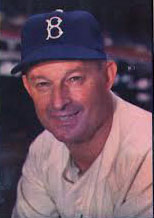
Charlie Dressen
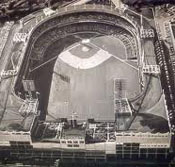
Polo Grounds
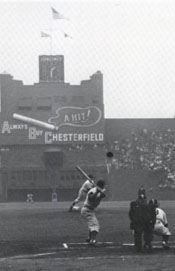
Polo Grounds with
Clubhouse in CF
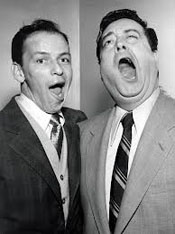
Frank Sinatra, Jackie Gleason
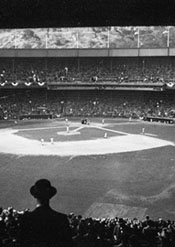
Polo Grounds press box visible in this picture from the 1921 World Series
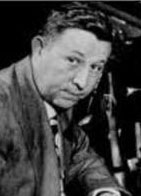
Russ Hodges
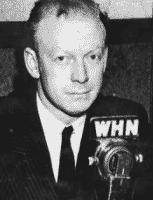
Red Barber
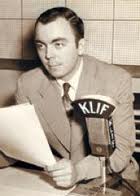
Gordon McLendon
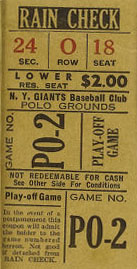
|
BASEBALL FEVER GRIPS CITY 3D DAY
- Thus read a headline in the New York Times Wednesday, October 3, 1951, on the occasion of the third game of the National League playoff between the Brooklyn Dodgers and the New York Giants.
- The Dodgers had forced the rubber game with a 10-0 rout at the Polo Grounds that ended the Giants' eight-game winning streak.
- Brooklyn had won the provisional coin flip the last week of the regular season to gain the choice of starting the series at home before playing two away or on the road before two at home. Skipper Charlie Dressen remembered then-manager Leo Durocher's oft-questioned decision in 1946 to begin the first ML pennant playoff at St. Louis in order to have the deciding game at home. The Dodgers proceeded to drop two straight. So Charlie grabbed home field for Game One only to lose, as Leo did, 3-1.
Times writer Bill Conklin gave examples to illustrate the "fever" gripping the Big Apple.
- The Dow Jones stock market tickers interlarded news of the second game:
Dow Jones 2 P M Stock Averages
30 Indus 27420 Up 164 or 60 PC
2d Inning Giants - No Runs Two Hits No Errors
Lockman grounded out Labine to Hodges
Thomson doubled to left
Mays beat out a slow roller to Reese Thomson taking third on the play
Westrum popped to Cox
Jones grounded out Reese to Hodges
Score at end of 2d - Dodgers 2 Giants 0
- Inmates in the city prisons hung over small radios provided by the guards to catch every detail of the game.
- At Belmont Park, many of the 22,000 racing fans followed the game on portable radios. Between races, PA announcer Fred Capossela gave updates.
- On the streets, pedestrians greeted each other with, "What's the score?"
- The New York Telephone Company received thousands of calls to its time-of-day number because the service also gave the inning-by-inning score. Right after the game ended, callers heard: When you hear the signal, the time will be 5:04 and one-quarter. Final score, Dodgers win, 10-0.
- Those lucky enough to own a television or have the time to go to a tavern or other public place with a set watched at least some of the game on 12- or 14-inch black and white sets.
- The first game of the playoff made history as the first baseball game shown live coast to coast, following by just two days the Duke-Pittsburgh football game, the first sporting event transmitted across the continent. [Alas, the coaxial cable would not reach New Orleans until the next summer.]
- The prospect of watching the telecast of the World Series and, as a bonus, the NL playoff prompted the wildest set-buying spree in television history before or since. In some cities, the sale of TVs actually exceeded the sale of radios. An estimated 16 million TVs were set up in homes and businesses.
- The Public Library in Stamford CO invited baseball fans to watch. By the fourth inning, more than 50 people took them up on the offer. The librarian reported that circulation at the library had increased 5% in the past year and that she did not subscribe to the belief that television is going to make us all illiterate.
Forgetting that momentum in baseball is only as potent as today's starting pitcher, the Dodgers from the manager down approached the deciding game with confidence. The gloom and defeatism that crept into every corner of the Brooklyn dressing room after the first game loss was swept away.
- Jackie Robinson after Game Two: They've had their lucky clothes on, now we've got some lucky clothes on ourselves.
- Dressen: We've got 'em on the run. My boys are back to slashin' and slammin'. Duke Snider is swinging again and Gil Hodges seems to have pulled out of his slump. Their failure to hit has been hurting us.
- Don Newcombe, Dressen's choice to pitch the third game even though he worked nine innings Saturday and 5 2/3 Sunday to help keep Dodger pennant hopes alive: I'm always ready to pitch. The Giants are tough but they don't worry me none. I'll be ready. I'm not too tired.
- One source of worry to their fans, if not the Dodgers, was the absence of C Roy Campanella, who had pulled a hamstring in the last regular season game on Sunday. Rube Walker, an able backstop but a much weaker hitter despite clouting a homer in Game Two, would replace Campy.
- Some Dodgers thought Durocher, now the manager of the hated Giants, had outsmarted himself by going with Sam Jones, only 6-10 for the season, in the second game instead of ace Sal Maglie on two days rest. But Sal explained: There is still some stiffness in my shoulder. If I gotta win a big game, I'd rather do it with my regular rest. He had shut out the Braves 5-0 on Saturday.
- With Maglie scheduled to start, oddsmakers made the Giants 6 1/2 to 5 favorites to earn the right to face the Yankees in the World Series starting Thursday.
As 1:30 pm approached, a variety of people, famous and not-so-famous, prepared for the clash.
- All across New York City, fans gathered in front of sets in homes and public places to form an audience that would comprise 90% of those viewing TV that afternoon by the seventh inning. By the time the game started, Times Square assumed a Sabbathlike calm, wrote a Times reporter. Channel 11, the NBC affiliate, would join 53 other stations nationwide showing the game.
- Abraham Chadwick, dying of stomach cancer, lay on his couch in Brooklyn, ready to watch on TV. The electricians' union had assigned the lifelong Dodger fan to the Polo Grounds to turn on the lights for night games and any day games when the umpires called for lights and to cater to any other electrical needs the club had. In July, the Giants asked him to install a buzzer system connecting the fourth window of the clubhouse to the bullpen in RCF.
- In Washington, numerous senators made arrangements to see at least part of the game in chambers adjacent to the Senate floor. Frank Bourgholtzer, NBC's White House correspondent, turned on a TV in the West Wing and tuned it to the game. Since press corps members spent most of their days waiting for announcements and interview opportunities, the game would provide a welcome relief from boredom although a blockbuster announcer would interrupt their viewing in the late innings.
- Comedian Jackie Gleason and singer Frank Sinatra met at Toots Shor's Restaurant in Manhattan. Frank had obtained three tickets from his friend Durocher. So Toots ordered a limo with a well-stocked bar to take him and his two pals to the Polo Grounds. Gleason, the only one of the trio rooting for the Dodgers, partook copiously of both the liquor and food by the time the group exited the limo and took their seats behind the Dodger dugout. (An urban myth says that J. Edgar Hoover joined them at the game. But the FBI Director was at work in Washington. He would attend Game One of the World Series the next day.)
- Heavyweight champion Joe Louis, in town to promote a fight, hurried from his press conference to the ballpark in time for the first pitch.
In addition to NBC's TV crew, six radio networks set up shop in the press box attached to the underside of the upper deck.
- Russ Hodges did the Giants' broadcast solo because NBC hired his partner, Ernie Harwell, to handle their telecast. Hodges's friend Bob Prince, the Pirates' announcer, sat next to him as a guest.
- Red Barber and Connie Desmond would, as usual, call the game for the Dodgers.
- The Liberty Broadcasting Network, which recreated most of its baseball and football broadcasts from its studio in Dallas, sent "The Old Scotsman" Gordon McLendon to call the game live. (His broadcast is the only one that survives on tape today.)
- Al Helfer reported the actcion on the Mutual Broadcasting System, largest in the nation.
- Harry Caray of the Cardinals broadcast the game for a group of Midwest stations.
- Buck Canel and Felo Ramirez did the Spanish broadcast for Latin America.
- Altogether, six of the first 13 recipients of the Hall of Fame's Ford Frick Award for broadcasters worked the game.
Surprisingly, the few fans who camped out all night to make sure they got tickets could have enjoyed a good night's sleep. Only 34,320 actually attended the game in the 55,000-seat stadium.
- The second game had attracted just 38,609.
- Giants owner Horace Stoneham explained the turnout this way: We didn't sell out because so many people were misled with the expectation of a sell-out.
- His own front office may have been partially to blame because on September 28, the club announced they would accept no more applications for World Series tickets, which led to this headline in the Herald Tribune the next day: GIANTS HAVE NO TICKETS! SERIES OVERSUBSCRIBED.
- Many fans may have assumed the playoff games were sold out as well. The TV ratings for the games showed that interest was at an all-time high.
Maglie and Newcombe warmed up in the unseasonable conditions: 71 degrees, damp, overcast with strong wind blowing to right.
Continued below ...
|
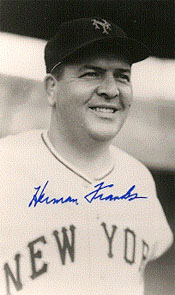
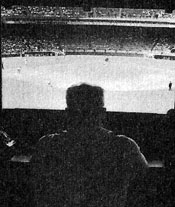
Giants owner Horace Stoneham watches a game from his office in the CF clubhouse at the Polo Grounds
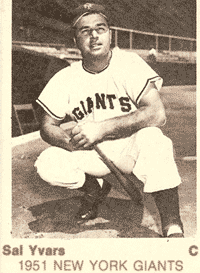
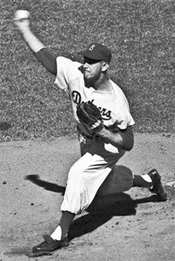
Clem Labine
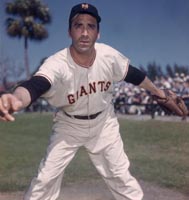
Sal Maglie
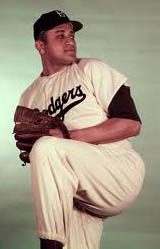
Don Newcombe
|
As the 3rd Game of the 1951 National League playoff between the Giants and Dodgers began, Giants coach Herman Franks headed under the stands to the CF Clubhouse.
- Without fanfare on the day he signed a one-year contract extension with the Giants for $50,000, manager Leo Durocher replaced Franks as the 3B coach on July 20 when the Giants trailed Brooklyn by 7.5 games.
- No one paid any attention to the change, assuming that Leo was trying to energize his team's offense. (A search of a national database of newspapers, including the New York Times, reveals not a single mention of Herman Franks during July and August, 1951.)
- Further, no opponent or reporter noticed that the coach was not on the bench during the games. Where was he?
- Franks sat in Durocher's locked office in the CF clubhouse. He peered through a telescope mounted on a tripod and trained on home plate through a partially open window. Within Herman's reach was a buzzer connected to the phones in the Giants bullpen in RCF and in their 1B dugout.
- The former C went into action when the Giants came to bat. The telescope gave him a head-on closeup of the C giving finger signals to the P. Herman quickly deciphered the code and tipped the calls to the batter by a simple system: when the C called for a fastball, Franks rang the buzzer. C Sal Yvars sat at the CF edge of the bench. When the buzzer rang, he would flash a sign by some agreed upon means - crossing or uncrossing his legs, tossing a ball into the air, or sitting still. Sal never appeared in a home game after July 20 for the duration of the season. He was too valuable in the bullpen.
- The players in the dugout could also tip the batter since they heard the buzzer there too. The code be as simple as calling out a batter's first name for a fast ball and using his last name or neither name for a curve.
- The Giants took 23 of their remaining 28 home games with the telescope system in place. If they had won just 22, they would have lost the pennant to the Dodgers by a game. New York also went 26-16 on the road in that period.
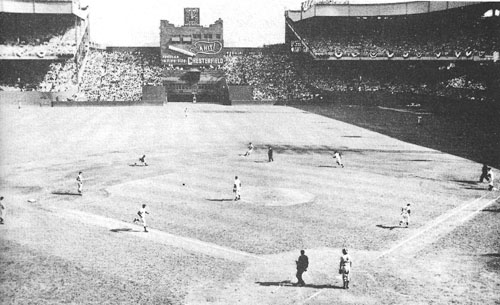
Polo Grounds Clubhouse in CF; note Giants bullpen in RCF behind rightfielder
In the Dodger dugout, RHP Clem Labine sat back to enjoy the game, figuring he had the day off.
- The day before, Clem mastered the Giants 10-0 to force the rubber game. Durocher praised the rookie. "Labine pitched a great game." What Leo couldn't say was that it was so great that, even knowing the pitches, the Giants couldn't scratch a run. That's how good the rookie's curveball was.
- Clem's performance exposed Manager Chuck Dressen's bullheadedness in refusing to pitch Labine the previous eleven days. He had infuriated his manager in the first inning of a start against Philadelphia September 21. The Phillies loaded the bases in the first. Dressen ordered Clem, who had won his last four starts after being called up from the minors, to pitch to Willie Jones from the windup. Instead, Clem threw from the stretch and surrendered a grand slam.
- So Charlie not only yanked Labine from the game, he removed him from the starting rotation and didn't even use him in relief. Finally, with no one else to turn to as the Dodgers faced their ninth game in eight days, the hardheaded skipper chose the rookie to save the season and he responded with a shutout.
Both managers had saved their aces for the final game.
- Salvatore Anthony Maglie strode to the mound for the Giants. He had won 23 games in 1951 and lost only six. Included in his victory total were five triumphs over the Dodgers.
- Although he was completing just his second full major league campaign, Maglie was 34 years old. His debut was delayed until age 28 near the end of the 1945 season because of World War II.
- Then he decided to head south to Mexico, attracted by the money Jorge Pasquel was throwing around to recruit American players to his new Mexican League. One of nine Giant system players to defect, Maglie quickly regretted his decision since playing conditions were worse than he experienced even in class D in the U.S.A.
- So he and the others returned home after two seasons. However, he returned a better pitcher thanks to the tutelage of his manager Dolf Luque, a Cuban native who won 194 games over 20 seasons in the majors. Dolf taught Sal to tighten the spin on his curve, throw it harder, and spot his pitches.
- His opportunity to showcase his new skills in American ball was delayed because the so-called "Mexican Jumping Beans" were blacklisted upon their return. So Sal pitched in Canada in 1949.
- Commissioner "Happy" Chandler reinstated Maglie and the other apostates in time for them to return to their original clubs for 1950. Sal exploded onto the scene, leading the NL in winning percentage (.818), ERA (2.71), and shutouts (5) with an 18-4 record.
- Sal later said: When I joined the Giants ... in 1945, [manager] Mel Ott told me, "If you want to make money, you got to beat the Dodgers. Pitch high and tight and low and away." Preferring high and tight, Maglie quickly gained a reputation for keeping hitters loose, so much so that he acquired the nickname "The Barber." It wasn't for his heavy beard but for the close shaves he gave batters with high hard ones to keep them from crowding the plate to hit his sharp curve.
- Sal had last pitched four days earlier, twirling a 3-0 shutout at Boston on the second-to-last day of the regular season to keep the Giants tied with the Bums.
Any thoughts of a second straight shutout vanished quickly.
- After RF Carl Furillo took a called third strike, Maglie walked SS Pee Wee Reese and CF Duke Snider.
- 2B Jackie Robinson singled to LF to score Reese, Snider stopping at 2nd.
- In danger of the game spiraling out of control, Maglie settled down and got LF Andy Pafko to groundout and 1B Gil Hodges to foul out.
Big Don Newcombe trudged to the mound for the bottom of the first.
- The 6'4" 220 lb righty from Madison NJ had won 56 games since his debut in 1949.
- The workhorse had thrown 776 innings in that time, an average of 259 per season.
- He led the NL in strikeouts in 1951 with 164.
- Don had pitched masterfully in his post-season debut, a 1-0 loss to the Yankees in Game One of the 1949 World Series. The tough luck loss would become a trademark of Newcombe's career.
- Newk, like Maglie, had started on Saturday and thrown a shutout, 5-0 in Philadelphia. He had also pitched three days earlier in Boston, a 15-5 Brooklyn victory. So he was starting his third game in eight days.
Oblivious to the fact that the Giants knew each pitch he threw, Newcombe set them down quickly in the first.
- 2B Eddie Stanky flew to LF.
- SS Alvin Dark popped up to 3B.
- RF Don Mueller lined out to LF.
Score after one inning: Dodgers 1, Giants 0
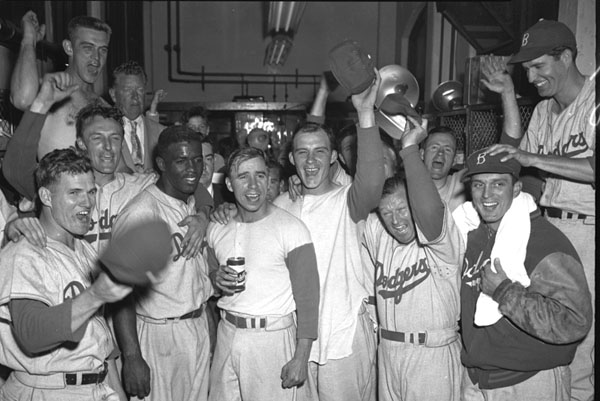 Dodgers
Dodgers exult after tying for the pennant; key players in the first row are Jackie Robinson, Pee Wee Reese (to Robinson's left), P Carl Erskine (in jacket). Clem Labine is in the upper left.
Manager Charlie Dressen is to Erskine's right.
Continued below ...
|
Pregame | First Inning
The final game of the 1951 NL playoff entered the second inning with Brooklyn leading 1-0.
- When Dodger manager Charlie Dressen went to the 3B coaching box, he found that his counterpart, Leo Durocher, as was his wont, had erased all the chalk lines with his spikes so he could creep toward home to more effectively bark at the home plate ump.
- Leo also wanted to create a better angle to steal signs from C Rube Walker, who replaced All-Star Roy Campanella, out for the second game in a row with a pulled hamstring.
- The backstop change caused only a minor dropoff in defensive prowess but a major decline in batting clout.
Campanella: 33 HR, 108 RBI, .325 in 143 games for '51
Walker: 2 HR, 9 RBI, .243 in only 36 games
- Dressen didn't mind Leo's handiwork since Charlie loved to steal a sign or two himself. However, Giants C Wes Westrum knew that and concentrated on hiding his signs from intruding eyes.
Sal Maglie retired the Dodgers in order in the third.
- 3B Billy Cox grounded to the box.
- Walker struck out swinging.
- P Don Newcombe popped to 3B.
Campanella and Newcombe wanted to win the game even more than their teammates.
- On September 21, leading the Giants by 4.5 games with only eight left to play, the Dodgers accepted 12,000 applications for World Series tickets.
- That same day, Campy and Newk both asked GM Buzzy Bavasi for advances on their World Series shares, receiving $4,440 and $3,600 respectively.
- That night, Brooklyn celebrated "Charlie Dressen Night" at Ebbets Field. The manager received a painting of himself with a plaque on the bottom frame that read: MANAGER OF THE BROOKLYN DODGERS - 1951 NATIONAL LEAGUE CHAMPIONS!
In the bottom of the second, LF Monty Irvin grounded to SS Reese and 1B Whitey Lockman singled to RF. That brought 3B Bobby Thomson to the plate.
- The Scotsman had endured an up-and-down five-year career with New York.
- His first full season, 1947, produced 2 HR, 85 RBI, and a .283 BA.
- But in '48 he dropped to 16 HR, 63 RBI, and .248.
- He bounced back the next season: 27 HR, 109 RBI, .309.
- Continuing the pattern, all three stats dropped in 1950, although not as far as they did in '48: 25 HR, 85 RBI, .252.
- 1951 had not produced the expected bounce back until July 20, when Durocher moved him from CF to 3B to make room for Willie Mays. At that point, Bobby was hitting only .237 with 16 HR. But from then to the end of the season, he smacked 15 HRs and raised his average to .289.
- A Sporting News article on Thomson's resurgence stated: He has been a tremendous tower of strength ever since the night of July 20 when Leo Durocher, in a sudden inspired move, told him to take over at third base.
- What the article didn't mention - because the writer didn't know about it - was that July 20 also marked the beginning of Coach Herman Franks stealing the opposing catcher's signs with his telescope in the CF clubhouse. No Giant benefitted from the purloined info more than the outfielder-turned-hot-corner-man.
So when Thomson stepped in to face Newcombe in the second, he peered beyond 2B Jackie Robinson to RCF where bullpen C Sal Yvars relayed Franks' tips.
- When asked many years later if he checked the bullpen during his at-bats in the final playoff game, Bobby replied, I don't know why I wouldn't have.
- Thomson took a ball, then lashed a single to LF. Andy Pafko field the ball cleanly to hold Lockman at second.
- However, Thomson, thinking he had a double, ran hard around first and chugged toward second until he realized his teammate occupied the base. SS Pee Wee Reese relayed the ball to 1B Gil Hodges, who easily tagged the embarrassed runner out.
- The steam taken out of the rally, Mays lined to LF to retire the side.
As the Giants took the field on the overcast day, the umpires ordered the lights turned on. A pundit in the pressbox said, Now maybe Thomson can see where he's going.
- Maglie ran his streak of consecutive batters retired to eight by getting RF Carl Furillo to ground to the mount, Reese to foul out to 1B, and CF Duke Snider to strikeout swining.
- Newcombe walked Westrum the open the bottom of the inning. But Maglie's bunt resulted in a 1-6 forceout at 2B, and 2B Eddie Stranky grounded into a 5-4-3 DP.
- During the home team's at-bat, Gordon McClendon speculated on his national broadcast: We may have had a famous repetition of the Fred Merkle incident here today, comparing Thomson's base-running error to the 1908 blunder that cost the Giants the pennant.
Both teams went down 1-2-3 in the fourth.
- Brooklyn: Robinson 4-3, Pafko K, Hodges 5-3.
- New York: SS Alvin Dark popped to 2B, RF Don Mueller lined to 1B, Irvin grounded out 5-3.
The pitching duel continued through the fifth.
- Cox led off with a bunt single, but Walker fanned again. Newcombe grounded into a force play at 2B before Furillo flied to left.
- Lockman grounded to Reese, but Thomson tried to make amends for his reckless baserunning by doubling on the ground down the LF line. With no runner ahead of him, his speed enabled him to beat Pafko's throw with a head-first dive.
- After Mays struck out, Dressen ordered Westrum walked intentionally to get to Maglie. While Newcombe threw four wide ones, Robinson complained to 3B umpire Larry Goetz that Durocher wasn't staying in the coaching box. So Goetz ordered Leo to stay put.
- Ralph Branca got up and started loosening in the Dodger bullpen in LCF.
- But he sat down quickly because Dressen's strategy worked like a charm as Maglie grounded to SS.
Score after five innings: Dodgers 1, Giants 0
Continued below ...
|
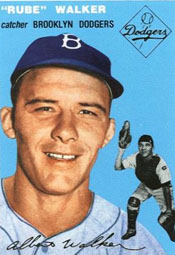
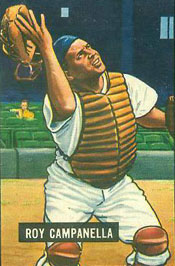
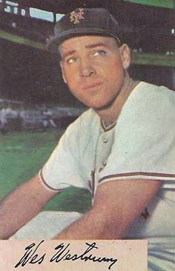
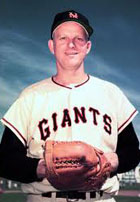
Whitey Lockman
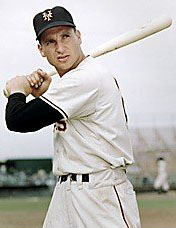
Bobby Thomson
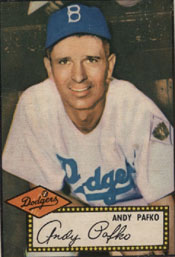
|
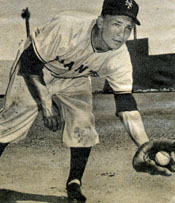
Eddie Stanky
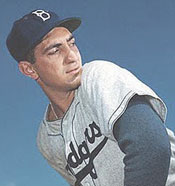
Ralph Branca
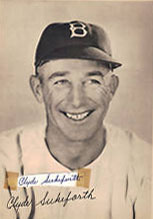
Clyde Sukeforth
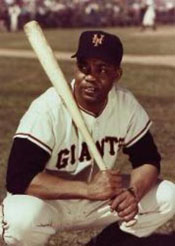
Monte Irvin
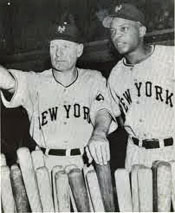
Leo Durocher and rookie
Willie Mays
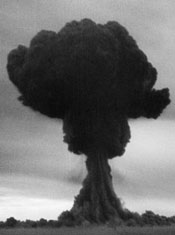
Soviet Nuclear Test
|
As the Brooklyn Dodgers came to bat in the top of the sixth inning of the third and decisive game of the 1951 NL playoff, they clung to a precarious 1-0 lead.
- After Jackie Robinson's first inning single drove in the game's only run, Sal Maglie had retired 11 in a row until a bunt single in the fifth. Then he retired the next three hitters.
- But as the tension mounted, Giants manager Leo Durocher sent his other starters to the bullpen to replace the relievers. With the pennant on the line, The Lip would go with his best if Maglie faltered.
The Barber escaped a shaky sixth with no damage.
- After SS Pee Wee Reese took a called third strike, CF Duke Snider singled to center.
- But C Wes Westrum threw out Snider as he attempted to steal, 2B Eddie Stanky applying the tag.
- Robinson walked, but LF Andy Pafko popped to 1B Whitey Lockman.
Dodger starter Don Newcombe entered the bottom of the sixth on a streak of 21 1/3 scoreless innings.
- Despite pitching on two days rest, Big Newk looked strong, setting down the home team with ease.
- Stanky: fly out to LF.
- SS Alvin Dark: grounder to 3B.
- RF Don Mueller: foul out to 1B.
Still, Brooklyn skipper Charlie Dressen was taking no chances. He had Ralph Branca warming up in the LCF bullpen.
- The 6-3 220 lb righthander arrived at the Polo Grounds that morning with his arm still stiff from his eight innings of work in the 3-1 loss two days earlier at Ebbets Field. His right triceps had ached ever since he threw back-to-back shutouts in late August.
- Trainer Harold Wendler applied the accepted treatment: a rubdown with Capsulin. As Branca recalled later, It burned so much, you forgot you had pain in your arm.
- As a starter, he needed more time to get ready to relieve. So he started tossing lightly in the fifth as bullpen coach Clyde Sukeforth watched closely. Branca's arm began to loosen as he continued through the sixth.
Clyde gained fame as the scout who recommended that the Dodgers sign Jackie Robinson before he even had a chance to see him play.
- GM Branch Rickey sent Sukey to scout the young SS for the Kansas City Monarchs of the Negro League. But, with Jackie out of the lineup with an injury, Clyde contented himself with interviewing the young man. Impressed with Robinson's intelligence and character, Sukey endorsed Rickey's plan to sign Jackie.
- Sukeforth ended up managing the Dodgers for the first two games of Robinson's ML career because of Durocher's suspension for associating with gamblers. Burt Shotton took over after that and guided Brooklyn to the '47 pennant.
- Sukeworth would move with Rickey to the Pirates in 1952 and later recommend drafting another young player - Roberto Clemente.
Maglie continued to baffle Dem Bums in the seventh.
- 1B Gil Hodges fouled out to C.
- 3B Billy Cox grounded to Dark.
- C Rube Walker grounded a single between 1B and 2B.
- Newcombe bounced out to Stanky, not even bothering to run to 1B.
Don finally faltered after Giants fans enjoyed their stretch.
- LF Monty Irvin smacked the second pitch on a line into LF and slid into second safely.
- That prompted Dressen to phone Sukeforth: "How's he throwing?" Sukey reported that Branca was in full throttle.
- Lockman looked to Durocher in the 3B coaching box for a sign before he stepped to the plate. Bunt? The Dodgers thought so, Dressen ordering a pitchout. But Irvin didn't move. Lockman bunted the next pitch a few feet in front of the plate. Walker pounced on it and fired to third but too late.
- With runners on first and third and none out, up stepped 3B Bobby Thomson who, despite two hits, wore the goat's horns for his base-running blunder in the second. All the Scot had to do now to redeem himself was hit a medium-range fly ball to plate the tieing run. With the count 3-1, he did just that, driving the ball to Snider in deep CF, Irvin scoring easily.
- Presumably, Thomson benefitted from knowing what Newcombe would throw thanks to the sign-stealing system the Giants employed.
- It was a good thing for the Giants that Bobby came through because rookie CF Willie Mays grounded into a 6-4-3 DP.
The 157-game season came down to two innings. Who would be the hero?
- Would it be an established star like Snider, Reese, or Robinson for Brooklyn or Irvin or Thomson, NY's leading RBI producers.
- Or would someone unexpected grab the spotlight, like one of the two Cs, neither of whom wielded a potent bat - Walker .243 and Westrum only .219).
- Would either pitcher last through the ninth? Would one of the starters that both managers deployed to their pens surrender the winning hit?
- Could fans survive a nerve-wracking extra-inning tilt?
Meanwhile, in the White House, the press corps interrupted their viewing of the game for an announcement by President Truman's Press Secretary.
- Frank Bourgholtzer, NBC's White House correspondent, had a particular interest in the goings on at the Polo Grounds. He had grown up in Thomson's hometown of New Dorp NY. His family knew the Thomsons well. In fact, when Frank outgrew his Lionel train set, they were given to Bobby, five years younger.
- Joseph Short began his press conference by promising, "This won't take long." He then announced that the Soviet Union had exploded another atomic bomb in their country. He concluded his statement with "Further details cannot be given without adversely affecting our national security interests." He finished in less than a minute.
- Bourgholtzer and his colleagues hurried back to their desks in the press room to file their reports before returning to more important matters - the game!
Score after 7 innings: Dodgers 1, Giants 1
Continued below ...
|
90% of the television sets in New York City were tuned to the game as it entered the eighth inning.
- The tension was unbearable as Sal Maglie took the mound. The Giants had just scored to tie the game at 1.
- Since yielding a run in the first, The Barber had set the Dodgers down on just three hits.
- Still, Leo Durocher had his second best starter, Larry Jansen, start warming up in the RCF bullpen. C Sal Yvars, an essential cog in the sign-stealing scheme when the Giants batted, caught the righty who had compiled a 22-11 record.
Maglie finally lost his touch.
- RF Carl Furillo lined back to the mound.
- But SS Pee Wee Reese lined a single to RF.
- CF Duke Snider grounded a single between 1B and 2B that sent Reese to 3rd.
- With 3B Jackie Robinson at the plate, Durocher worried that his counterpart, Charlie Dressen, would order a double steal. So Leo signalled for a pitchout. But no one moved. Ball one.
- Maglie's next pitch dove into the dirt and skipped past C Wes Westrum. Reese raced home, and Snider took second. Brooklyn led again.
The Dodgers weren't through.
- Durocher ordered two wide ones to Robinson to set up a DP with lessthan-fleet LF Andy Pafko due up.
- In today's baseball, Jansen would replace an obviously tired Maglie. But managers followed a different script in 1951.
- Pafko did just what the Giants wanted. He smacked a sharp grounder to Thomson at third. But the ball kicked off Bobby's glove into foul territory. Snider scored to make it 3-1, and Robinson held at 2nd. Although the scorer called it a hit, many New York fans thought the Scotsman should have made the play.
- Maglie got 1B Gil Hodges to pop to Thomson.
- But 3B Billy Cox smashed a grounder that took one hop past Thomson's ear to drive in Robinson.
- Finally, Sal got the elusive third out when C Rube Walker grounded out, 2B Eddie Stanky to 1B Whitey Lockman, on Maglie's 109th and last pitch.
Reporters began thinking about, if not actually writing, paragraphs singling out Thomson as the game's goat.
- His baserunning blunder in the 2nd had thrown cold water on a potential Giant rally.
- And now he failed to snare not one but two catchable grounders. A better third-sacker, like Brooklyn's Cox, would have kept the Bums from scoring even one run.
Don Newcombe mowed down the Giants on ten pitches in the bottom of the 8th.
- Bill Rigney pinch hit for Westrum but struck out.
- Hank Thompson batted for Maglie and grounded out 3-1.
- Stanky fouled out to Reese.
Many in attendance conceded the game to the Dodgers.
- Some of the wives of Giants players left their seats in Section 19 for the ladies lounge beneath the stands. The Brooklyn fans were heckling us, said Antoinette Yvars.
- High in the upper deck behind home plate, Yogi Berra and four Yankee teammates hit the road disappointed that they would be playing the World Series at Ebbets Field (capacity 34,000) rather than the 55,000-seat Polo Grounds. Yogi said, We wanted to beat the crowd. Newcombe was pitching good. I thought it was over.
- Two dozen writers left the pressbox and headed for the Brooklyn clubhouse in CF for the postgame celebration. They squeezed into the Dodger lounge to wait out the 9th. 300-pound clubhouse man John Griffin sat in a chair in front of the only window with a view of the field. Fortunately, Griffin had the radio tuned to Red Barber's broadcast.
Jansen took the mound for the 9th. If Giants fans were second-guessing Durocher in the 8th, Larry's performance provided more fodder.
- With Newcombe set to leadoff, Dressen didn't even consider a pinch-hitter - another unimaginable decision from today's viewpoint that says, "Bring in the closer for the 9th." Newk grounded to 2B.
- Furillo hit another grounder, this one to SS Al Dark.
- Reese flew to Willie Mays in CF.
- Among Larry's nine pitches, only one was a ball.
Clem Labine, the shutout winner in Game Two, left the Dodgers pen at the start of the 9th to hurry to the clubhouse.
- He hadn't smoked before coming to the majors at the beginning of the season. But a tobacco company paid him $500, 1/10 of his salary, to endorse their product.
- They also supplied him with hundreds of cartons of unfiltered cigarettes each month. Although he passed most of them to his friends, he decided to start the habit himself.
- Since players couldn't be seen smoking in uniform, he sat by his locker with a calming cigarette amid the champagne cases and TV cameras awaiting the victorious Dodgers.
- As soon as Jansen recorded the third out, Clem hurried back to the bullpen in LCF.
The Dodgers were three outs from surviving the Giants' furious pennant race finish.
Score after 8 1/2 innings: Dodgers 4, Giants 1
To be continued ...
|
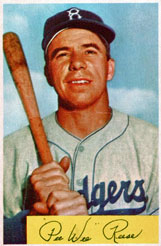
Pee Wee Reese
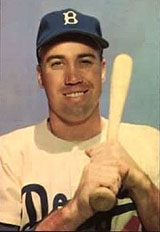
Duke Snider
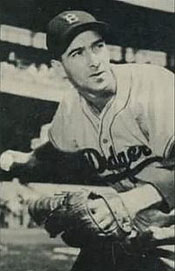
Billy Cox
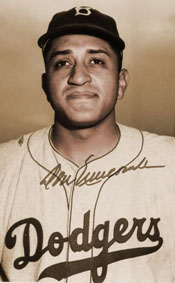
Don Newcombe
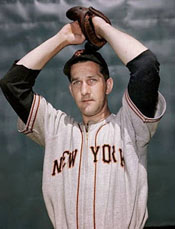
Larry Jansen
|
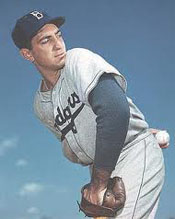
Ralph Branca
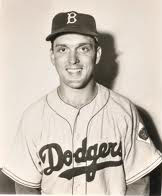
Carl Erskine
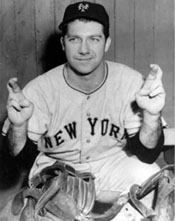
Hank Schenz
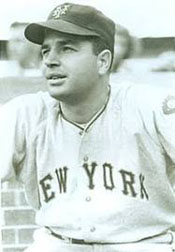
Sal Yvars
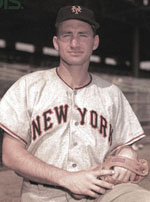
Alvin Dark
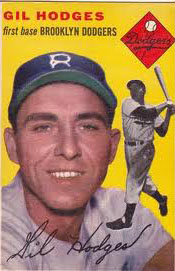
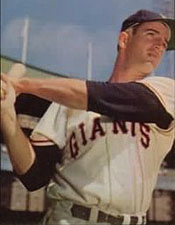
Don Mueller
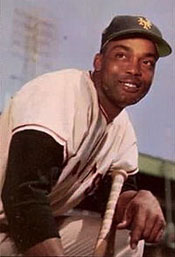
Monte Irvin

Whitey Lockman
|
Pregame | First Inning | Innings 2-5 | Innings 6-7 | 8th & Top of 9th
Don Newcombe trudged to the mound for the bottom of the ninth with a 4-1 lead.
- Big Newk was about to throw his 32nd inning in eight days. In the last 22 2/3 innings of that string, he had given up a single run, the one the Giants scored in the 7th to tie the game temporarily.
- After the 7th, the strapping right-hander came to the dugout and claimed he was tired. Jackie Robinson gave Newk no sympathy. Don't give me that tired shit. Get out there and pitch. (Another source relates the conversation like this: [Newcombe] came back to the dugut and announced frankly, "My arm's tight," only to be upbraided by his teammate Robinson: "Bullshit, you go out there and pitch until your goddamn arm falls off." The injured Campanella tried to cajole him more gently into doing the same ...)
- Don did just that, retiring the Giants in order in the 8th. Still, when Newk returned to the bench, he told manager Charlie Dressen, It looks like I just don't have it anymore. Take me out.
- But Dressen, following the conventional wisdom of the day when teams had no closers, left the decision up to his pitcher, who had no choice but to try to get the last three outs lest he damage his standing in the eyes of his black teammates.
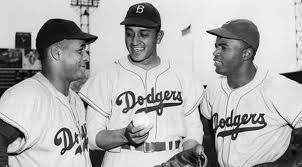
Roy Campanella, Don Newcombe, Jackie Robinson Still, Charlie covered his bets.
- He had not one but two pitchers warming up in the LCF bullpen, both righties: Ralph Branca and Carl Erskine.
- Bullpen coach Clyde Sukeforth caught Branca, throwing the ball back in time to watch Erskine's pitch come in alongside him.
Durocher tried to rally his troops before he headed to the coaching box but did so in a strange way.
You've had some kind of year. You got nothing to be ashamed of. When you go off the field, hold your heads up high.
When Newcombe finished his warmups, Robinson walked to the mound from his 2B position to shake Don's hand.
- Perhaps Jackie wanted to make amends for fussing at Don two innings earlier. At any rate, the gesture provoked mixed feelings in the Giants' dugout.
- Reserve IF Hank Schenz, the former Cub who brought Durocher the telescope he had used from the scoreboard in Wrigley Field to divine opponents' signs, yelled: Don't shake yet! It isn't over!
- But another backup IF, Jack "Lucky" Lohrke, had resigned himself to defeat. Piss on the fire and I'll call the dogs. I think the hunt's over.
- The Dodgers laughed and joked in their dugout, confident of victory. And why not? History favored Lohrke's attitude. Never in baseball's previous 278 playoff and World Series games had a team overcome a three-run deficit in the ninth inning.
- Meanwhile, reserve C Sal Yvars slid to the CF edge of the bullpen bench in RCF apart from his teammates to make sure the batters could see the signs he relayed from the buzzer that coach Herman Franks rang or didn't ring to signal fastball or curve from his perch behind Schenz's telescope in the CF clubhouse.
All over the New York area, Giants fans tried their own ways of bringing luck to their heroes.
- In Queens, Mary Fitzgibbon brought the statue of St. Jude,the Catholic patron saint of lost causes, she kept in her bedroom and set it atop the radio that brought the broadcast to her and her 13-year-old son.
- On Staten Island, two adult brothers decided to run counterclockwise around the dining room table.
- Morty Rothschild left his box seat down the 3B line at the Polo Grounds, went to the parking lot, and drove away because he had noticed that his beloved Giants didn't lose when he was behind the wheel.
Alvin Dark stepped into the box wielding his black bat.
- The SS had not had a good playoff series. He had gone 0-for-3 against Newcombe to give him 1-for-12 in the three games.
- After taking a strike and fouling off several pitches, Dark hit a grounder between 1B and 2B. The ball glanced off Gil Hodges' glove toward second to put the leadoff man on. It was only the fifth hit off Newcombe.
- Afterwards, Dressen talked of the rally-starting hit: It was just a protective swing. And he just got it out of Hodges' reach. If Gil could have held the ball in his glove, Dark would have been out.
- Sore arm reliever Clyde King had never seen Dressen so jumpy. Since the 7th, Charlie had phoned the bullpen every few minutes. Who's ready? Who's ready?
- Now Dressen called the bullpen to ask the same question. Sukeforth judged Branca, who first got up in the 5th, the sharper of the two warming up. Years later, Clyde remembered: Branca was showing off. He wanted to pitch tomorrow in Yankee Stadium. He was really humming. But Erskine looked good too.
Still, Dressen made no move as RF Don Mueller came to the plate.
- Don had compiled the same playoff batting average as Dark, 1-for-12.
- With a three-run lead and Mueller batting left-handed, you would think Dressen would signal Hodges to play his normal position and not bother to hold the runner on. But Gil, obeying his skipper's order, stood a few paces diagonally off the bag. (See picture below.)
- Known for his ability to place the ball where he wanted in Wee Willie Keeler "Hit 'em where they ain't" style, Mueller recalled years later, What happened next was no accident. I always checked the fielders before I swung. If Hodges had played deep, I would have swung differently ... Mandrake the Magician, as he was called, rapped a belt-high fastball on the ground through the hole between first and second past a diving Hodges. Dark reached 3B easily.
- Robinson again visited the mound. Two cheap hits. You're all right. But Newk disagreed. No, I ain't. I ain't all right.
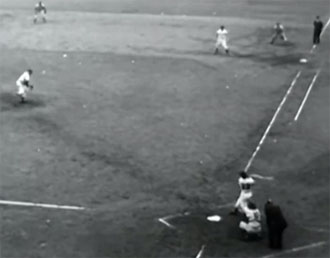
Mueller Smacks Single to Right of Hodges Yet, when Dressen visited the mound, Newcombe said he wanted to stay in. I'm okay.
- But even with the NL's RBI leader, LF Monte Irvin, coming up, Charlie wasn't thinking about changing pitchers so much as changing catchers. He knew Campanella got more out of Newk than anyone else. But he was worried about the large amount of foul ground in the Polo Grounds. Suppose Irvin hit a pop foul and Roy couldn't reach it on his gimpy leg?
- So Charlie told his battery to keep the ball away from Monte and returned to the dugout without making a change.
Unlike the previous pair of hitters, Irvin, a right-handed batter, had an earlier safety off Newcombe, his third of the three-game playoff.
- Durocher told 3B umpire Larry Goetz: Now a belt. A home run right now.
- But on a 1-1 pitch Monte popped to Hodges in foul territory.
- Irvin, who prided himself on coming through in the clutch, slammed his bat down in disgust. When he returned to the dugout, he didn't look at teammates. I was trying too hard to pull the ball, he muttered.
At this point, the following announcement was made in the press box: Attention, press: World Series credentials for Ebbets Field can be picked up at six o'clock tonight at the Biltmore Hotel.
Giants owner Horace Stoneham left his office in the clubhouse in CF to go downstairs and console starting pitcher Sal Maglie. Horace found the righthander on his way to the shower. Sal, you had a hell of a year. Have a beer.
Newcombe now braced for another left-handed batter, 1B Whitey Lockman, who had singled in the 3rd to give him 2-for-9 in the playoff.
- Now, however, Lockman was looking to tie the game with one swing. But Newk wasn't about to let that happen and kept the ball away from the left-handed batter.
- After fouling off the first offering, Whitey lashed Newk's 100th delivery over 3B Billy Cox's head down the LF line against the wall on two bounces. As the crowd roared, Dark scored easily, and Lockman pulled into 2B with a standup double.
- As Mueller neared 3B, he looked to the outfield and, seeing Andy Pafko throwing to 2B, chose not to slide. But the last second decision caused him to catch his spikes in the dirt and twist his left ankle, tearing tendons.
- Just a step away, Durocher called for time and waved for help. The game was delayed while the team doctor and trainer attended to Mandrake.
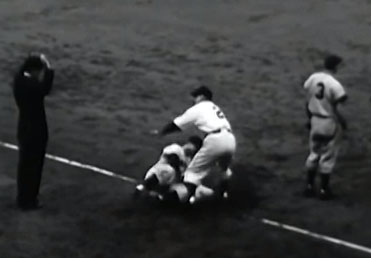
Durocher Calls for Time to Help Mueller That gave Dressen time to change pitchers if he so chose, but first he made another frantic call to the bullpen to ask for a recommendation.
- Sukeforth told him, Erskine just bounced a curve, but Branca's fast and loose.
- Little did "Sukey" know that his boss would use those words against him after the game.
Continued below ...
References: It Ain't Over 'Til It's Over, The Baseball Prospectus Team of Experts (2007)
Pennant Races: Baseball at Its Best, Dave Anderson (1994)
|
"Shot Heard 'Round the World" - Bottom of the 9th - II
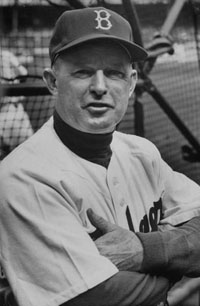
Charlie Dressen
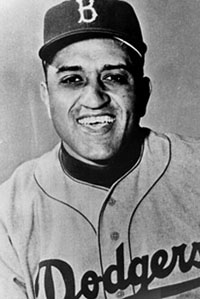
Don Newcombe
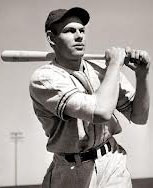
Clint Hartung

Allan Roth
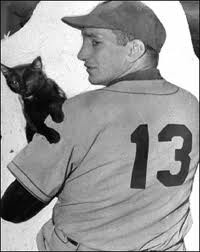
Ralph Branca tempts fate.
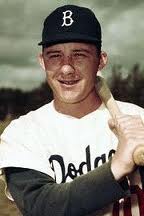
Rube Walker
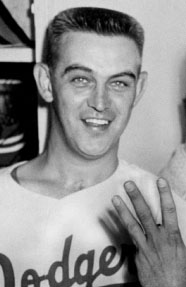
Clem Labine
|
Pregame | First Inning | Innings 2-5 | Innings 6-7 | 8th/Top of 9th | Bottom of 9th - I
As Dodger manager Charlie Dressen walked out to talk to his exhausted starter, Don Newcombe, with the tying runs on second and third and one out in the bottom of the 9th, he still hadn't decided what to do.
- The infield gathered on the mound. Dressen asked, What do you want to do? It's your money as well as mine. Three days later, 2B Jackie Robinson recounted Newk telling Charlie, This is too important a game to take a chance on my arm.
- Reese, the captain, couldn't believe that Dressen, who always had the answers, asked them to make the decision. Newk's given us all he's got for the last week. Why don't you get somebody fresh in here?
- When 1B umpire Jocko Conlan came to the hill to force a decision, Dressen made the signal to the bullpen.
- In LCF, coach Clyde Sukeforth patted RHP Ralph Branca on the back as he slipped on his jacket and started his walk to the mound while Don Mueller was being attended to after severely hurting his ankle going into 3B on Whitey Lockman's double. Don was carried off the field on a stretcher, replaced on 3B by Clint Hartung.
Durocher later explained why he chose Hartung as the pinch-runner.
Don Mueller is laid out at 3B and his ankle is twisted, the oddest injury I have ever seen at a time like this. ... Now, the last thing in the world you want when you have a pitcher on the ropes is to give him a chance to compose himself, and so I'm also screaming insults at ... Newcombe. Not that I needed any encouragement. The truth is that I had been trying to get into a fight with Newcombe from the time we tied the score in the fourth inning. After every inning, I had waited for him to pass me on his way back to the dugout so that I could let him know what a choke-artist he was. Inning after inning, Don had just walked on by and given me the kind of winking look that says, "Keep trying, Leo, but it ain't going to work." ...
You can imagine how I'd been giving it to Big Newk after each of the hits [in the 9th]. Everything I could think of. As he was waiting for the stretcher to take Mueller off the field, he was giving me the kind of look that wasn't filled with cool amusement any more. ...
I looked down my bench and for some reason or other picked out big Clint Hartung, who was six feet five and very far from the best or fastest runner on the team. ...
As Big Newk left the mound he started right for me. ... Hartung, who was standing right alongside me, said, "Let him come over here, I'll take care of him." That's when I knew why I had picked Clint Hartung. He was the only man in the ball park bigger that Don Newcombe. Newk took a couple of more steps toward me before he got ahold of himself and swerved sharply toward the clubhouse ...
Now coming in to pitch for the Dodgers, #13 Ralph Branca.
- His 15th relief appearance of the season came two days after pitching the opening game of the NL playoff at Ebbets Field. He was three-for-three in saving victories for Newk. As Ralph sauntered in, LF Andy Pafko yelled, Go get 'em, Ralph! CF Duke Snider added, Go get 'em, Honker! (a reference to Branca's big schnozz).
- After he warmed up for several innings in a row, Ralph's arm felt looser and stronger than at any time since his two consecutive shutouts more than five weeks earlier. I can be a hero, he thought.
- As Newcombe strolled to the clubhouse in CF, Giant fans waved handkerchiefs. The guy who had pitched his guts out for the Dodgers down the stretch could still win but couldn't lose since he left with a 4-2 lead and two men on.
- Dressen usually went over the next hitter with the new P but didn't say anything to Ralph other than the obvious: Get him out. The manager who prided himself on his memory didn't remind his P and C Rube Walker that Clem Labine had struck out Thomson the day before with a curve. Instead, he gave Branca the ball and left abruptly. Even from CF, Snider could tell that his manager was really uptight.
In making his decision, Dressen ignored groundbreaking statistics that were available to him.
- Dodgers GM Branch Rickey had hired Allan Roth in 1947 as baseball's first full-time statistician. Roth kept track of how each batter did against each pitcher, providing mathematical evidence, for example, that left-handed batters generally hit better against right-handed pitchers and right-handed hitters preferred southpaws.
- Manager Burt Shotton welcomed Roth's reports. But when Dressen took over in 1951 upon Rickey's ouster, he paid no attention to the numbers, preferring to trust his instincts honed over a lifetime in baseball, including a long period as a coach under Durocher. Leo also made no use of Roth's numbers in his last season as Brooklyn manager. So Allan provided stats to broadcasters Vin Scully and Jerry Doggett, making them the first announcers to pay attention to pitch counts of starting pitchers.
If Dressen had consulted Roth's numbers before calling for a reliever to pitch to Thomson with the pennant on the line, he would have learned this.
- Bobby had faced Branca 49 times in his career and hit .265. In 1951, though, Thomson went 4-for-12 against Ralph with a triple and two HRs, one of which, a two-run shot, won Game One of the playoff, 3-1.
- The Scotsman had gone 12-for-22 lifetime against Erskine (.545) with five extra base hits, including two round-trippers. Dressen, who tended to put pitchers in his doghouse after just a couple of bad outings, knew that "Oisk" had lost his last two starts.
- But if Jolly Charlie had checked Roth's calculations while preparing for the game, he would have warmed up southpaw Preacher Roe, against whom Thomson hit just .220 and who had thrown only 1 2/3 innings in five days. But Roe, who had an incredible 22-2 mark in mid-September, had been shelled in his last two starts, causing Dressen to toss him on the junk heap for the playoff. When asked later if he had considered Preach, Charlie replied that he was saving him for Game 1 of the World Series.
Dodger press agent Irving Rudd sat in the Polo Grounds pressbox next to Roth, who had been banished from a front row seat next to the dugout when Dressen took over the club.
- During the delay before Thomson's AB, Rudd asked Allan, What are the statistics on Ralph Branca pitching to Thomson?
- As Rudd recalled in 1990: Roth shakes his head, kind of sad. "I want to leap out of the upper press box and parachute to Charlie Dressen imploring him not to use Branca."
- Roth knew that Branca pitched poorly against the Giants. Ralph had given up 10 HRs to New York that season, three more than the rest of the league combined hit off him.
- Nearly 40 years later, Roth lamented, He [Dressen] made little or no use of the information I provided. The man didn't want help from anybody. He thought he could do it all by himself. It's always been that way with the big ego managers. They couldn't believe a statistician sitting in the stands could give them information they didn't know themselves. So Charlie ignored me.
Durocher had changed his mind about statistics.
- Impressed by the data a 24-year-old statistician at Standard Oil, Jack Carter, had been compiling on baseball, the Giants hired him as a consultant before the season for $2,000.
- While Carter's system was not as well developed as Roth's, Leo welcomed the information, changing his batting order in response to Jack's suggestions.
|
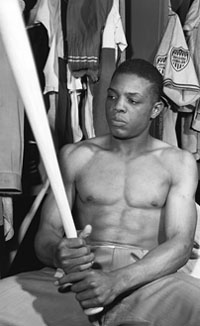
Rookie Willie Mays
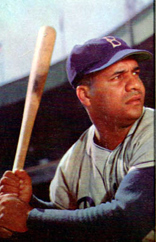
Roy Campanella
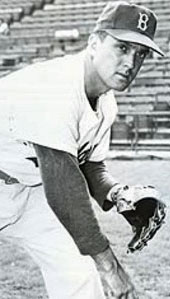
Carl Erskine
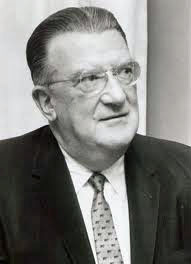
Walter O'Malley
|
With the delay in attending to Mueller, Dressen had time to think about walking Thomson with first base open.
- Doing so would replace the Giants hottest hitter with 20-year-old Willie Mays.
- As Roth could have told Charlie, the rookie CF had hit just .233 since September 1 with only one HR and was 1-for-10 in the playoff series. Furthermore, Mays was a paltry .105 (2-for-19) against Branca.
- Lacking confidence, Willie was afraid the Dodgers would walk Thomson intentionally. Mays wasn't very religious but, as he knelt in the on-deck circle, he prayed, Please don't let it be me. Don't make me come to bat now, God.
But there was no way an old-school skipper like Dressen would violate an ancient law of baseball: Never put the potential winning run on base.
- Charlie had been a coach on the 1947 Dodger team that lost to the Yankees in seven games in the World Series. He saw NY manager Bucky Harris intentionally walk Pete Reiser with two outs in the 9th inning of Game 4 in order to pitch to Eddie Stanky. But PH Cookie Lavagetto doubled off the RF wall to drive home the tying and winning runs (and break up Bill Bevens' no-hitter)
- Also, the Dodger staff respected Mays despite his recent slump. As Branca revealed the following spring: Willie may not have had a great average last year, but the Dodger pitchers all respected him. You could fool him, but you couldn't make any mistake and get away with it. He was too liable to get a hold of one and ruin you. ... No, I never gave any thought to walking Thomson, and I don't think Dressen did either.
Second guessers would also wonder why Dressen didn't put Campanella behind the plate for the 9th or at least insert him with Branca.
- The league's best backstop suffered from a charley horse. While he couldn't run, he could crouch and call pitches.
- Years later, Dressen said that the only thing he would have done different would have been to put Campy in because he would have gotten Newcombe through.
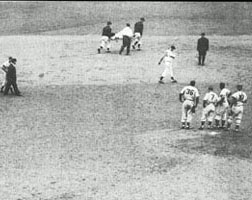 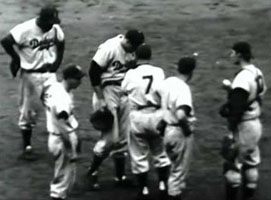
L: Don Mueller is carried off on a stretcher. R: Branca arrives at the mound.
Note that Newcombe has left, giving the lie to the oft-repeated story of Branca
slapping Don on the back and promising to hold the lead for him.
Thomson had run down to 3B to check on Mueller.
- After Don was carted off, Durocher, remembering that Bobby had hit the HR off Branca two days earlier on a slider, told his hitter to expect fast balls.
- Thomson walked back to home plate psyching himself up. As he recalled later, I called myself a son of a bitch. I'd never done that before. As he neared the batter's box, he heard Leo yell, Boy, if you ever hit one out, hit one now.
- Meanwhile, Walker talked strategy with his new P. Carl Erskine, who continued to warm up after Branca was summoned, recalled the pregame meeting on the hitters. We had said keep the ball up. Thomson was a low ball hitter. So Rube told Branca to try to get ahead of Bobby with a fastball. Then they'd bust him high and in to set up the low outside curve.
- As Branca threw his warmup pitches, his St. Christopher medal bounced around his neck. His fiancee Ann and brother Al watched from just behind the Dodger dugout down the 3B line. Ann, whose parents were part-owners of the club, turned to the principal partner, Walter O'Malley, and said, Isn't it nice of Dressen to call in Ralphie to nail down the pennant?
- Thomson claims that he was so distracted by Mueller's injury and his own thoughts that he didn't notice until he stepped into the box that Newcombe was no longer on the mound. Branca! Where did he come from?
Ironically, Branca and Thomson had once been linked in trade discussions.
- In December 1948, when the Giants were offering Bobby to Boston and the Dodgers dangled Ralph in front of the Pirates, Brooklyn GM Branch Rickey asked Durocher what it would take to get Thomson. Leo responded that he wanted just one player: Branca.
- The Sporting News reported: When Leo Durocher demanded Ralph Branca in exchange, Rickey retreated.
|
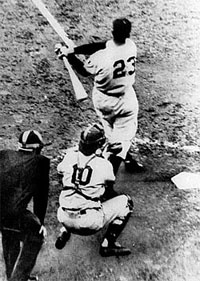
Thomson connects.
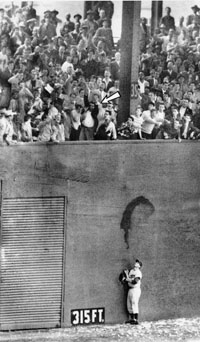
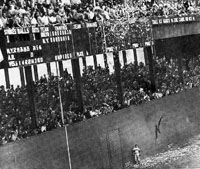
Pafko looks up helplessly.
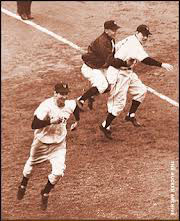
Stanky hugs Durocher as Thomson flies past them.
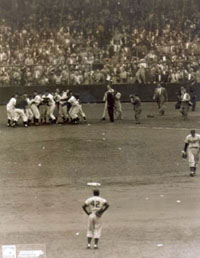
Branca heads to clubhouse as Robinson checks that Thomson touches all bases.
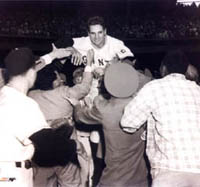
Bobby lifted up by fans.
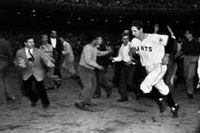
Thomson races to clubhouse.
|
So as people on both sides prayed in the stadium and across the city, what is arguably the most famous at-bat in history began.
- As planned, Walker signalled fastball. Lockman leading off 2B tried to read the signs, but Rube had just changed them when Branca came in. So Whitey touched his belt buckle to tell the batter that he couldn't read the sequence.
- But Coach Herman Franks behind the spyglass in the CF clubhouse had no problem deciphering what Walker showed. He rang the buzzer in the RCF bullpen behind C Sal Yvars. Since the buzz meant fastball, Yvars didn't move. Years later, Thomson had no specific remembrance of getting a sign from Yvars but admitted that he always looked for it.
- So he knew what was coming but didn't swing. The ball came in a little low and little inside but in the strike zone. As Thomson recalled, That first pitch was a blur, not because it was so fast but because I was so nervous my eyeballs were vibrating.
- Erskine, who had paused from his warmup to watch, shouted, No! Ralph, not down there! Good night! Not down there!
- Durocher figured the Bums would stick with the hard stuff. C'mon, Leo yelled plateward, he'll throw you another one! Leo explained years later: I'm not thinking of a home run; a home run never occurred to me. This is the last inning, we've got to get that tying run in, that's all I'm thinking about.
Walker called for another fastball.
- This one was a bit higher and more inside, actually a better pitch (from the defense's point of view) than the first one.
- But Thomson, not wanting to risk another called strike, turned on it and slammed a liner toward the LF stands. Instead of hustling to back up the plate, Branca stood on the mound screaming, Sink! Sink! Mays, with a great view from the on-deck circle, didn't think it would be a HR.
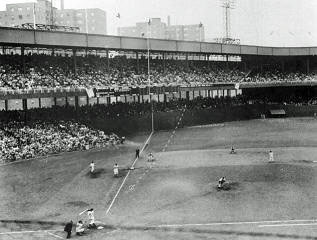
- Durocher: When the ball left Thomson's bat I knew it was going to hit the wall, but it didn't occur to me that it was going over. There were very few home runs hit into the lower deck at the Polo Grounds because of the overhang from the upper deck. Only a line shot - a rising line drive - ever went in there. This one was far too low to hit the overhang, and it was a sinking line drive. I can't remember any ball hit like that ever going in before. (The fans out there told me later that it got over the fence by no more than the width of the baseball.) ...
As soon as I saw the ball was up in the air, I automatically yelled for Hartung to tag up. A split second later, I could see the ball wasn't going to be caught and I'm screaming for Lockman to come on. ... that's when I turned to pick up the ball again ... and all of a sudden there was no ball. And that's the last thing I really remember. I would have bet my life I would have kept my head in any kind of crisis but I didn't. I blanked out.
- Pafko stood at the wall and gazed up as the ball just made it into the seats over the 315' sign. Afterwards he said, The ball was hit so hard, it didn't have a chance to dip.
Ellen Pafko was not with the other Dodger wives at the Polo Grounds. She was at their home in Chicago, where Andy had played for the Cubs before being traded. With Brooklyn up 4-1, she called a cab to take her to the station to catch a train to New York for the World Series. The taxi arrived just before Thomson came to bat. She told him, Can you wait a minute, please? The game's almost over. A few minutes later, she returned with misty eyes and told the driver, I'm sorry. I don't need you.
- Giants radio announcer Russ Hodges made the call for the ages: There's a long drive. It's gonna be ... I believe ... the Giants win the pennant! The Giants win the pennant! The Giants win the pennant! Bobby Thomson hits it into the lower deck of the LF stands! The Giants win the pennant, and they're going crazy, they're going crazy.
- Durocher: Pee Wee Reese is still in his normal position at SS, with his hands on his knees, looking back over his head, his mouth open in surprise.
- As Thomson raced around the bases, jumping for joy, Branca picked up the rosin bag for some reason, threw it down, stuck his mitt in his back pocket, and started the long journey to the clubhouse in CF with bowed head. His fiancee cried in her box seat.
- Monte Irvin saw it all from the dugout. We were stunned for a moment. Nobody said anything, nobody moved, even though we saw that the ball had gone in the stands. Then it struck us: We'd won. It sank in. We began jumping up and down and yelling. All that joy and excitement flooded into us like so much nervous energy and I think if we hadn't started yelling and jumping we would have exploded. ... It was chaos. Happy chaos. And then pandemonium broke loose throughout the whole ball park. One thing I'll always remember, though: Jackie Robinson was standing there watching Bobby circle the bases, making sure he touched each one.
- C Wes Westrum: Several Giant players cracked their heads against the roof of the dugout when we jumped up to see where the ball went.
- Mays, closest to Thomson when he hit the "Shot Heard 'Round the World," seemed in shock. He didn't get up from his kneeling position until Thomson reached 2B. The delay put him on the fringe of the mob of players waiting at home plate. Willie jumped up and down as if on a pogo stick, showing his great athletic ability. Bobby leaped the last 10' onto the plate.
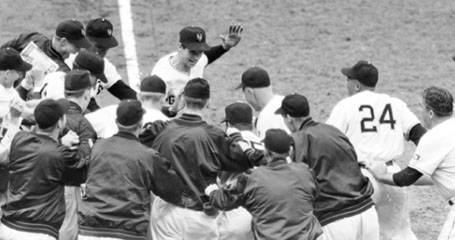
Thomson arrives at home plate.
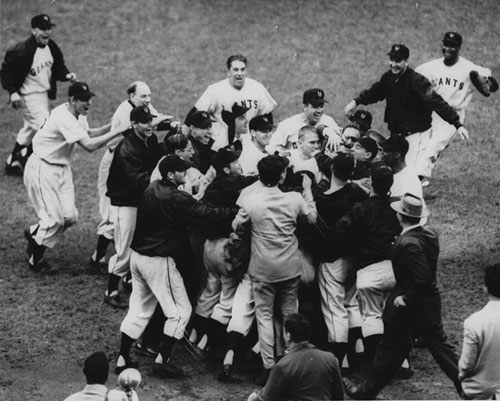
Thomson mobbed a few seconds later, Durocher and Stanky arriving at the left.
- Eddie Stanky, Branca's one-time roommate with the Dodgers, ran all the way to Durocher at 3B and tried to jump on his back, then locked him in a bear hug as Leo struggled to make his way to home plate.
- In the Dodger bullpen, Labine told Erskine, I didn't see a ball go into the stands. I saw my wallet go into the stands with $5,000 in it. They grabbed their jackets and headed to the clubhouse.
- In the NY clubhouse, Sal Maglie, the starting P sent to the showers, lifted up bulky owner Horace Stoneham, put him down, and did a jig with him.
- Irvin: We were all at home plate, waiting for Bobby. Our next problem was getting from home plate to the clubhouse in CF. The fans were swarming all over the field, patting us on the back, shaking our hands, pulling at us. Too many well-wishers can be scary. Finally, the police came and helped us get through.
- One fan grabbed Thomson's cap. A large Giant fan put a headlock on Durocher, who thought it was an enraged Brooklyn rooter trying to kill him. By the time two policemen tore him away from me he had completely cut my windpipe off. I couldn't breathe. ... Through the entire victory celebration ... my throat was so raw that I couldn't talk above a whisper, a hell of a spot for me to be in at a time like that.
|
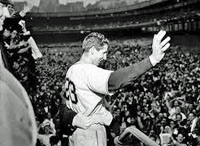
Thomson waves to crowd from clubhouse stairs.
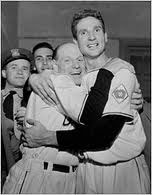
Durocher hugs Thomson.
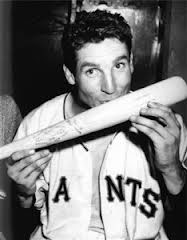
Thomson poses.
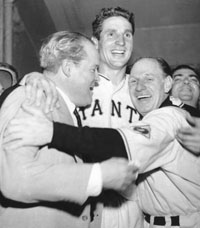
Horace Stoneham and Durocher hug their hero.
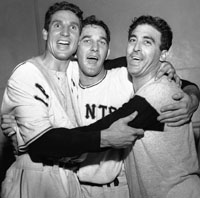
Winning P Larry Jansen (C) with Sal Maglie and Thomson.
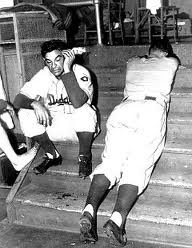
Branca disconsolate in the clubhouse with Coach Cookie Lavagetto.
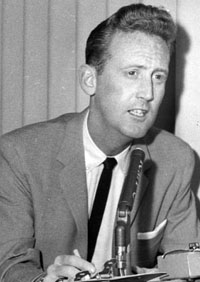
Vin Scully
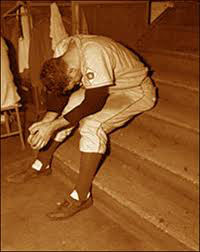
Branca after being told to sit up.
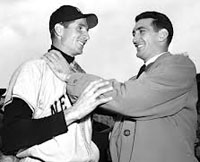
Branca and Thomson before Game 6 of the 1951 World Series
|
One Dodger fan got revenge of sorts on a Giant fan.
- Just as Branca threw the fateful pitch, comedian Jackie Gleason, after an afternoon of indulging, threw up on Frank Sinatra sitting next to him behind the visitors dugout.
- Ol' Blue Eyes saw not the swing for the ages but instead looked down on regurgitated beer and hot dogs.
- Frank lamented years later: Here is one of the all-time classic games, and I don't see Bobby Thomson hit that HR. I just heard the Giant fans going wild around us. Only Gleason, a Brooklyn fan, would get sick at a time like that.
When the Giants finally reached their clubhouse, a surprise awaited them.
- A pessimistic attendant had either not chilled the champagne or put it away when the Dodgers took the 4-1 lead. So the Giants drank warm champagne. Mays, who hadn't tasted any bubbly before, almost threw up.
- The fans gathered at the foot of the clubhouse stairs chanted, We want Thomson! We want Thomson! He soon appeared at the top of the steps, smiling and waving as the crowd roared. Other Giants came out and waved too. Lockman wasn't one of them because he was stretched out in the trainer's room with a sore neck. I tried to pick up Bobby and carry him off. I got him up on my shoulders, then we got crushed by the fans. Irvin approached him, still mad at himself for popping up before Whitey's AB in the ninth. Thanks for picking me up. You picked us up all season, Lockman told him. You should be the MVP this year.
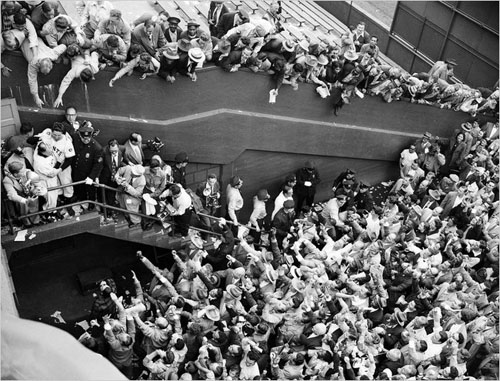
Fans besiege the Giants clubhouse below Durocher and Thomson.
- The reporters and camera crews that had set up in the Brooklyn dressing room quickly changed venues.
- Larry Jansen secured his 23rd victory in relief of Maglie, who also won 23. Larry called over from his locker. Hey, Sal, remember when you were nine and two and I was four and four? I told you, "I'll catch you" and you said, "If you catch me, we'll win the pennant.
- O'Malley, Dressen, and several Dodger players, including Reese and a tearful Duke Snider, stopped by to offer congratulations.
- When Dressen shook Durocher's hand, he reminded Leo of their conversation during their train ride from California to spring training in Florida. You said we'd finish one-two. I didn't think I'd be two.
- Robinson told Bill Rigney, I want you to know one thing. We didn't lose it. You won it.
- Labine stopped at Thomson's locker to shake hands. Looking up, Bobby asked, Who are you? Still in a daze, he didn't recognize the pitcher who struck him out with the bases loaded the day before.
- Thomson had another visitor, a representative of the Perry Como TV show who asked if the hero could appear on the live broadcast that night for $500.
That's really nice, but I want to get back to Staten Island to see my family. My mother and my sisters didn't come to the game.
How about if we give you a thousand dollars?
For a thou, I guess my family can wait.
Meanwhile, the Dodgers were still in shock next door.
- Reese (as told to Durocher): When I walked off the field and we were in the clubhouse, I just sat in front of my locker and I said to myself, "It's not so. They just called time for a minute. We're going to go back out and play. ... They can't beat us with one swing of the bat like that after we were in front by thirteen and a half.
- When reporters arrived, they found Branca stretched out, face down, on the stairs. Snider heard Ralph muttering, Why me? Why me?
- Eventually, the losing P went to his locker and faced reporters. I guess we weren't meant to win it. The ball was high and inside. Not a good pitch. Years later, he would say, If I had it to do over, I would make the waste pitch low and outside.
- Newcombe, too numb to speak, dressed quickly and departed quietly. He didn't suspect that this game would be cited in years to come as evidence that he "couldn't win the big one."
- A reporter asked Dressen if he considered walking Thomson. Yes, I did. Five times this year I walked the winning run and got away with it. But Thomson? The next guy could have hit a HR too. [For the record, Mays had 20 round-trippers in 1951. The Shot Heard 'Round the World was Thomson's 32nd.]
- O'Malley was asked if there was any fair reason for the undercurrent of talk that Dressen's job is in jeopardy. Walter replied, No, there is no fair reason. The manager's job did not depend up on the outcome of this game. (Charlie would manage the Dodgers to pennants the next two seasons before O'Malley fired him because he couldn't beat the Yankees either time.)
Vin Scully, just ending his second year as a Dodger broadcaster, told this story to Tom Verducci in 2016: First of all, Red Barber had said to me when I first started, "I don't want you to get close to the players, because if you get too close to the players, it will change your descriptive powers. Suddenly you see your man make an error, and you'll try to make up for it and it would become a twisted broadcast."
The one fellow I got close to, despite Red's rulings, was Ralph Branca. And Ralph was going to marry after that game - the next week. And he and [his fiancée] Ann and I went around the world together ...
So when the ball was hit, there was a home run, and I instinctively looked down at the club box because my friend Ann was there. And I watched her very deliberately, carefully open up her purse, take out a handkerchief, close the purse, open the handkerchief and bring it up to her face. And I really felt sorry for her and for everybody.
And then in those days, in order to get to the clubhouse, you had to walk all the way to centerfield, and you went up the stars and went in the door. And then there were, like, three steps to go up to the next level. And there was my pal sprawled on the steps, head down, arms extended. And I actually had to tiptoe over him. So, it was really tough.
Anyway, it was deathly quiet and I thought, I can't hang out here. So I went up into a trainer's room, and there was Jackie and Pee Wee. Just the two of them. ... I walked over and didn't say a word - just sat down in a chair and it was silent.
And then Pee Wee said, "You know, Jack, the one thing I just don't understand?" And Jackie said, "What, Pee Wee?" He said, "Why this game hasn't driven me crazy."
Fan reactions to Thomson's HR throughout the city and beyond
When Branca finally left the clubhouse, Ann was waiting in the parking lot with their friend Pat Rowley, a Jesuit priest at Fordham University.
- Branca asked the same question he had muttered earlier. Why me, Father?
- Rowley: God chose you, Ralph, because He knew you'd be strong enough to bear this cross. Branca #13 effigies appeared in Brooklyn in the days ahead.
- Five days after the World Series, Ralph and Ann got married.
- Losing three of baseball's first six playoff games was enough to make the man who defied superstition to the point of having the vanity license plate 13-RB decide to change his uniform number to 12 for 1952. His family had pushed the change for some time.
- The Dodgers returned $190,000 in undeposited checks for World Series tickets. Included was a note: We have no alibis. Your loyalty, particularly at this time, is deeply appreciated.
The Giants couldn't celebrate into the wee hours because the World Series started the next day at Yankee Stadium.
- Durocher's crew won Game 1 and had a 2-to-1 lead after copping Game 3.
- But the Yankees took the next three to send Joe DiMaggio into retirement with another championship.
References: Nice Guys Finish Last, Leo Durocher (1975)
Pennant Races: Baseball at Its Best, Dave Anderson (1994)
Baseball's 25 Greatest Pennant Races, Lowell Reidenbaugh (1987)
It Ain't Over 'Til It's Over, The Baseball Prospectus Team of Experts (2007)
Willie Mays: The Life, The Legend, James S. Hirsch (2010)
"Vin Scully", Tom Verducci, Sports Illustrated
5/16/2016
|
|
|











































































